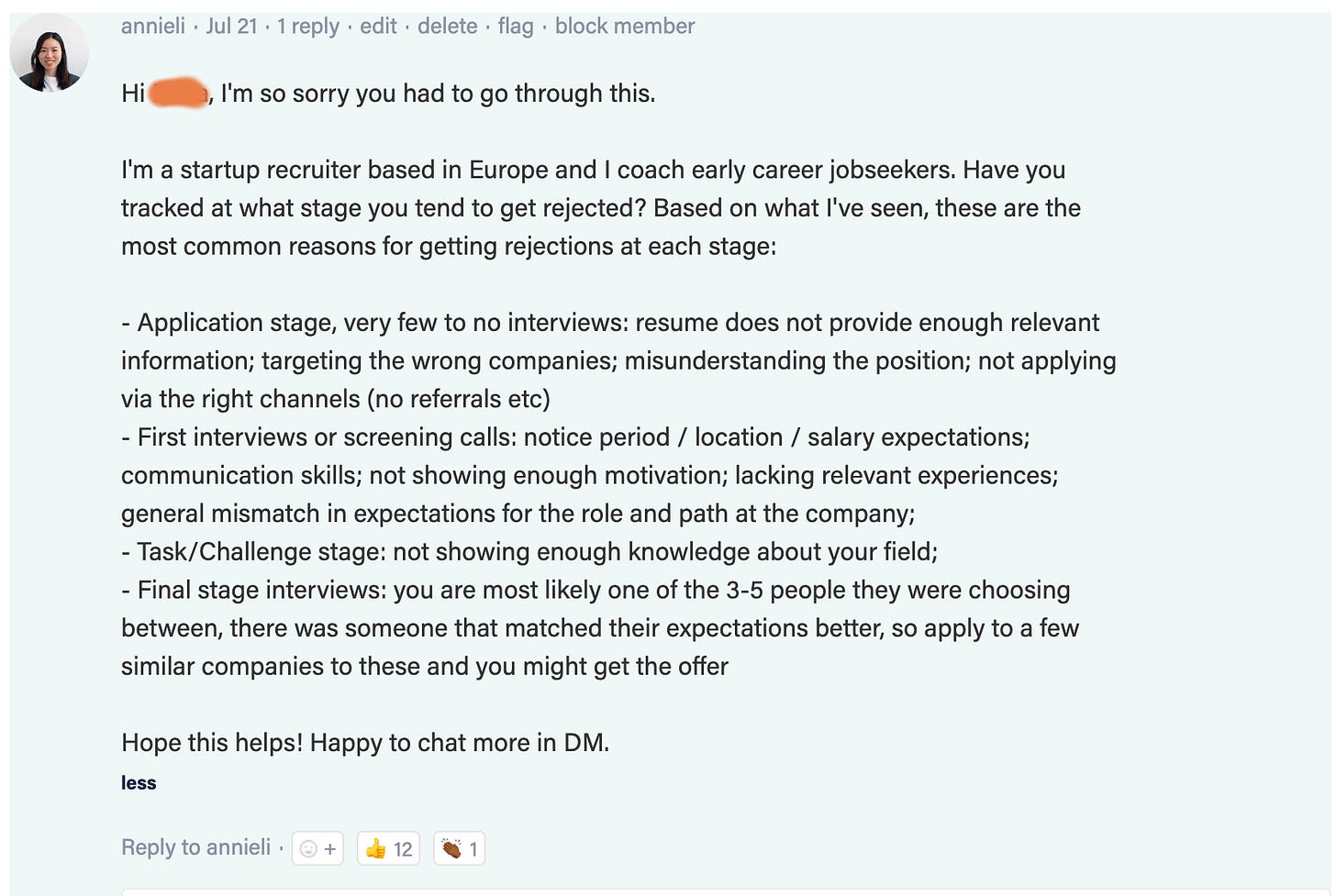Why am I rejected? Troubleshooting your job search
Most rejections come down to a handful of reasons. This newsletter is a complete break down of (almost) all likely reasons for your job search.
Last week I was browsing Elpha, a female networking community (as mentioned in the previous issue on professional communities). Someone shared their experience of submitting 800+ applications over the course of a few years with no success, despite having worked with internationally renowned organizations. I wrote a short response asking if they’ve tracked their rejection stage with a breakdown of reasons, and woke up to 13 reactions and 1 reply (doesn’t seem like a lot, but Elpha is still a growing community).
Outside of Elpha, jobseekers have came to me again and again with the exact same question: I submitted this many applications, but nothing is happening! What did I do wrong? Of course, the details will differ based on the profile/job/company, but I want to offer you a framework to start troubleshooting your own job search.
Why can’t I just receive some feedback?
Your job search shouldn’t feel like shooting in the dark. Unfortunately, most interview processes cannot provide you with specific feedback, even when you’ve asked nicely replying to the recruiter’s rejection email again and again.
1. Legal reasons
I, sadly, am also one of the recruiters that have not provided feedback via email in the past, and my hands are tied. This is mainly because the legal team of most companies advise them to not provide specific feedback to candidates in order to avoid lawsuit. While most jobseekers are probably not going to go to court with a company, recruiters are hired by companies to represent the company’s interests.
2. So much work
At this point, I’m sure most of you are aware that one recruiter might deal with anywhere between 50-500 applications for just one role they are working on (and they most likely have at least 5-10 roles at a time). The sheer volume of workload makes it very hard to reply to everyone asking for specific feedback. At the end of the day, the recruiter is there to make hires, and they are intrinsically motivated to focus their time and energy on those who might be hired, rather than those who don’t (sorry friends, it’s the sad sad truth of capitalism 🥲 ).
3. It’s not you, it’s them
You can still be rejected if there’s someone who’s even stronger, or simply came into the process earlier than you. This does not mean that you cannot do the job, but most of the time we only have one headcount for each position. This is more likely to happen for junior positions with a lot of applicants or if you make it to the end of the process and receive a rejection.
4. Not everyone can take feedback
You’d be surprised… I’ve offered a feedback call to candidates in the rejection email, and next day received a long, condescending reply. If they don’t want to take feedback , then why am I offering?
This is how someone replied to their rejection email…
But what if I really want to connect and understand how to improve?
Ask for a feedback call! It’s more time-consuming from the recruiter’s side, but if you ask nicely, they might take it! The difference between a call and a written email is, it’s (in most countries) illegal to record a phone call without consent, and without a recording it’s very hard to win a lawsuit! You are eliminating the recruiter’s biggest concern. Success rate might vary, but think of this as another way of networking with them. You might cross paths in the future and it’s always beneficial to maintain a good relationship.
So, what are the top reasons for rejection?
Track your applications and rejection stages, because when you are rejected matters a lot. Summed up in a chart:
One interview rejection might not be able to tell you a lot, but if you received 4 or 5 rejections, map them out by stage on your job search tracker (which we talked about in a previous issue), and you can start seeing patterns. What’s the stage you are most often rejected at? Work on getting past that.
Was it the application or first interview stage? Lucky you — I’ve already written a piece on writing your CV and another on preparing for your first interview.
What do you think? Was this helpful? Any follow up questions? I honestly would love your feedback (and will reply this time)! Write your thoughts, maybe others are wondering about the same thing.




Hi Annie,
thanks for sharing this post. This is a valuable resources provided internally from a recruiter.
Unfortunately I got thousands of rejections getting only temporary contracts all the time.
Analyzing my CV and stats, I think the most effective way to get a job is building trust with your connections. Like a sales funnel in marketing: why a company should hire a complete stranger?